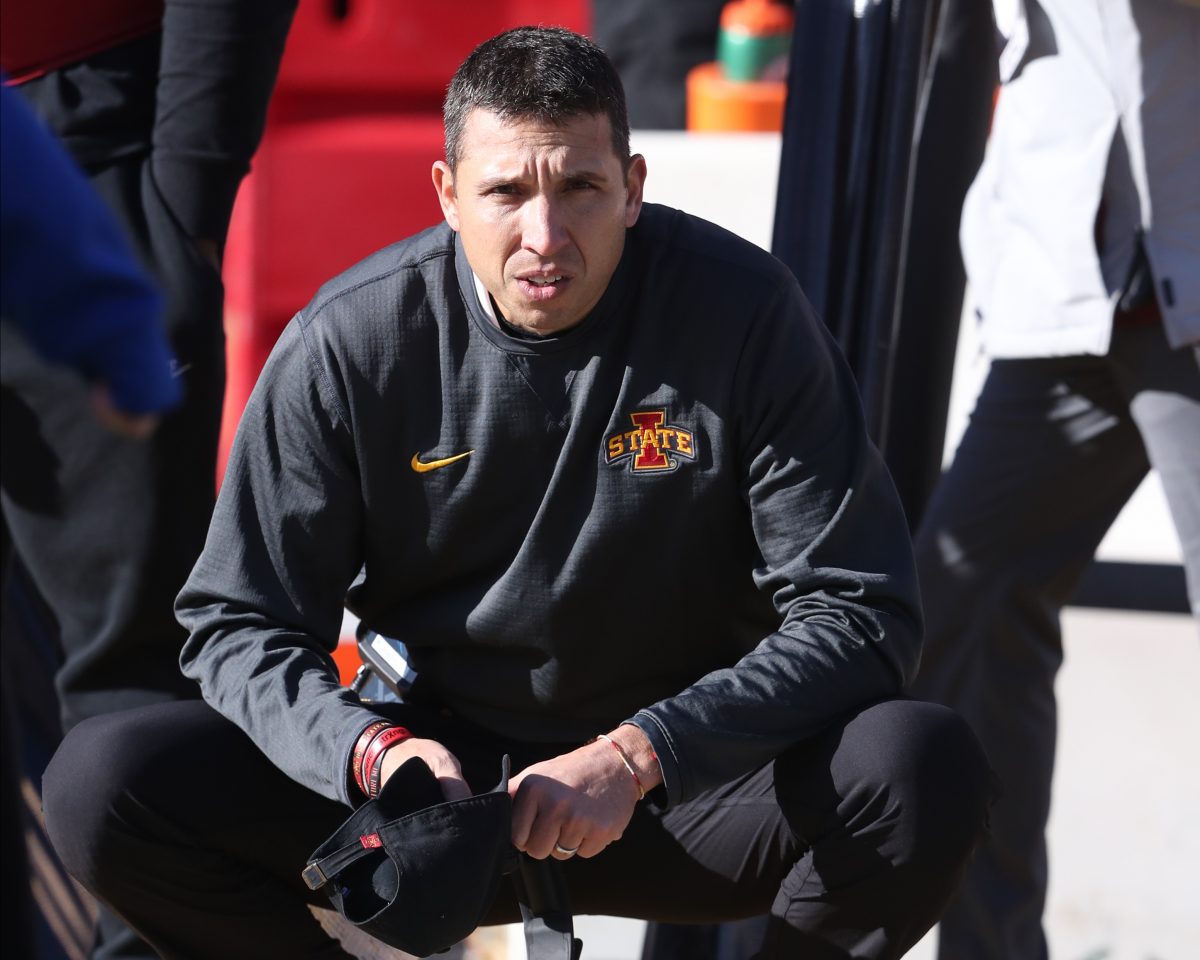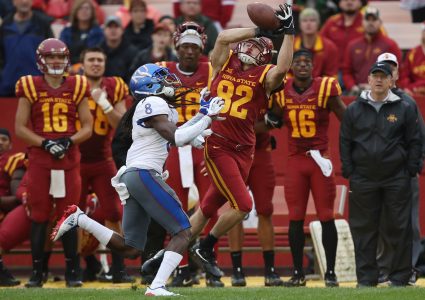Nov 23, 2019; Ames, IA, USA; Iowa State Cyclones head coach Matt Campbell watches his team play the Kansas Jayhawks at Jack Trice Stadium. Mandatory Credit: Reese Strickland-USA TODAY Sports
On Wednesday, the Milwaukee Bucks made a nearly unprecedented move when they refused to leave their locker room.
In the wake of a Kenosha, Wis. police officer shooting unarmed African-American man Jacob Blake seven times in the back on Sunday, the Bucks made it clear they were taking a stand by sitting out. There would be no basketball on that day in the NBA bubble… or the day that followed it… or the one after that.
Athletes across the country started to take similar stances from the MLB to the NHL to tennis to NFL minicamps to… you get the picture. This trickled through every level of our country’s athletic infrastructure.
Sports, something Washington Nationals pitcher Sean Doolittle called a “reward for a functioning society” earlier this year, had largely come to a halt.
In the minds of these athletes, society was not functioning at a high enough level to earn its reward, but, almost immediately, a question arose.
What comes next and what do these athletes want?
The answer from NBA players began to trickle out in media reports throughout the day on Thursday. They wanted an actionable plan for social justice. Not only for the players themselves, but from the owners of the teams they play for.
Friday morning, the NBA released a statement detailing that actionable plan. It includes the creation of a social justice coalition made up of players, coaches and owners. It includes an initiative that will turn every NBA arena owned by its home franchise into a polling place for the 2020 general election, and even if they cannot do that then there will be a way found to utilize the building for election purposes. Lastly, the statement promised television ads built promoting greater civic responsibility and engagement.
Simply, the NBA and NBAPA’s statement boiled down to one thing: Vote.
When I say this movement has trickled through every level of this country’s athletics infrastructure, I mean it. Some colleges have halted practice in solidarity with the movement started by the Bucks. On Thursday, former Iowa State basketball player and coach Fred Hoiberg, now the head coach at the University of Nebraska, stood behind his team as they read prepared statements calling for change. Some college programs, including the University of Oklahoma on Friday, have led marches through their campus.
Many of these messages have been centered on the idea of not only calling for change, but finding the best ways to create it. At Iowa State, that has been part of the program’s conversation for several years, according to head football coach Matt Campbell, but especially so since racial tensions in the United States spiked following the death of George Floyd under the knee of a police officer in Minnesota in May.
“I think our challenge within our walls is how do we grow? How do we make a difference? How do we continue to stand together and empower change? I think that’s where some of the things that you’re seeing on a national level are really empowering,” Campbell said on Friday during a Zoom call with the media. “That people are out there creating change and making a difference. I think that’s something that we continue to educate ourselves on and continue to grow within our own walls. How, whether it be locally or nationally, can we continue to find ways to not only bring awareness to a situation, but how can we find ways to create change? That’s a lot of where our conversations have rallied around within our own program. It’s really an honor for me to have some great coaches and great players that have led some great conversations and growth opportunities for all of us and continue to find ways for all of us to grow and make a difference.”
Conversations like this are nothing new for Campbell or his iteration of the Iowa State football program. In 2017, the Cyclones’ at-the-time second-year head coach stood behind the program’s all-time leading receiver, Allen Lazard, when the senior pass-catcher criticized President Donald Trump on Twitter and concluded the tweet with #TakeAKnee, a reference to former San Francisco 49ers quarterback Colin Kaepernick’s decision to kneel during the national anthem starting with a preseason game four years ago this week.
“I don’t have an issue with our guys taking a stance in what they believe in,” Campbell said at the time. “Whatever our guys do, you hope it’s unified, you hope it’s powerful.”
Powerful is a word Campbell uses often when referring to football players. He did it a lot on Friday when referring to the leaders and voices that have moved to the forefront of the social justice movement, pushing for tangible change across the country.
For athletes across the country, that is what this entire week has been about. Rather than just calling for change, rather taking a knee or putting a message on a jersey, how can change actually be created and what role can the world of sports play in that?
With that idea in mind, I posed a question on the teleconference with Campbell. How much have they talked about voting inside their walls?
“Matter of fact, that’s a great question, Jared, I think one of the things from the very get-go that our players have rallied around is that very topic. The understanding of the voting process. I think where we’ve really tried to sink our teeth in is not only vocalizing change, but how do you create change? Over the last month and a half to two months, educating ourselves in those areas,” Campbell said. “One of the parts of our program that we spend a lot of time on is development and growth. That has nothing to do with football. That has everything to do with every aspect of life. The voting piece of it, we’ve actually done a lot. Hopefully by the end of next week every one of our guys will be registered to vote. Then, I think one of the neat things for us on that is then educating our young men on the topics and why voting is important, how to make a great choice, what’s that mean, what’s it look like. Those are all things I think we’ll continue to grow in as these important times continue to move forward.”
I included that one sentence in bold because it is far and away the most important piece, and there’s a story here that I will tell in a second that truly made this stand out to me. In my mind, this was proof that not only are Campbell and the Iowa State football program giving lip service to change, they are focused on figuring out ways to create it — and the reality for most citizens is the only way to create it is by performing their civic duty and stepping into a voting booth.
Now, the story, in 2016 I was in my first year as the staff writer at Cyclone Fanatic. Matt Campbell was in his first season as Iowa State’s head coach. On the side after his weekly press conference in early November, I asked Campbell how much they talked about voting and elections inside the program. He admitted to me that he’d forgotten Election Day was approaching, but that civic duty was a piece of their conversations at times.
My, oh, my, how the world has changed in the last four years. I have no clue how many of Iowa State’s players on that 2016 roster were registered to vote, but I would be willing to bet it was at most a small majority.
Maybe I am wrong in thinking that, but I am definitely willing to bet there was no way every player inside the program was prepared to step into a voting booth at that time.
The reason I told that story is by no means to shame Campbell or anything of the sort, but a way to encapsulate the maturation process of the Iowa State football program off the field, something we talk considerably less about than the growth we’ve seen on it over the last three years.
“The world right now is in a crazy spot. My opinion on it, it makes me frustrated, disappointed. I think we’re all doing a good job, especially here at Iowa State, of trying to find solutions. I’ve got to give thanks to Coach Campbell because he always lets us voice our opinions,” senior safety Lawrence White said. “He gives an open dialogue for our team. We needed that when the George Floyd situation happened. I think that was very beneficial for our program and just our players just to really get an understanding of where certain players are coming from and just hear everybody out. I think we’ve really grown tremendously just from that. My hometown (Bakersfield, Ca.), I want to work with the kids back in the community. I told my team this a long time ago, my hometown, we’ve got one of the deadliest police forces in America. I’m used to this situation, this topic. It’s something I want to help and do everything I can in my power to fix this situation.”
My entire point in writing this piece was to commend Matt Campbell and his staff, along with the leaders on the team, for leaning into the uncomfortable conversations rather than pushing them away. Instead of just making things about football and trying to put society on the back burner, the program has made it a central piece of becoming a stronger unit dedicated to creating change and not just bringing attention to a desire for it.
Who knows if something like this could have happened four years ago. Maybe it would not have happened nine months ago. The good thing though is that it is happening.
Making something happen has been the theme of the week, after all.
“This is a powerful time. This is a time where these opportunities to educate, to stand for something, to grow, to have empathy, to have conversation, that’s the time that we’re in,” Campbell said. “To see great leaders stand up for what they believe in and demand and find ways to create change, that’s what’s powerful. Those are conversations that we have inside of our walls. Those are conversations that we have to learn, to grow, to educate ourselves and to conversate. I’ve said this before, I think it’s a really powerful time. It’s a powerful time to be part of team sports. It’s a powerful time to have powerful conversation.”





